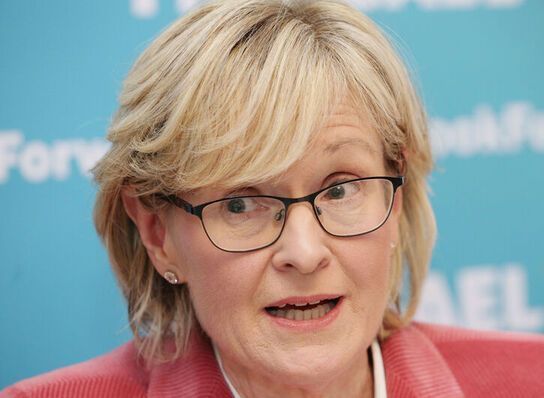Munich-based mezzo-soprano Tara Erraught made her debut at the Metropolitan Opera in “Les Contes d’Hoffmann” on Sept. 26 and is currently starring there in “Hansel and Gretel.”
PHOTO BY PETER MCDERMOTT
By Peter McDermott
Tara Erraught never had any doubts.
After a night out in Verona at age 13, she knew she wanted to be an opera singer and she knew she could be one.
“They weren’t thinking anything on it,” she said of her parents’ decision to attend the opera that night during their Italian vacation. They couldn’t know that it would mean a shift at the Feis Ceoil in Dublin from singing Irish folk and European art songs, as their daughter had been doing since age 9.
Now at 31 and a decade into her professional career, the German-based Erraught is widely recognized for what the New York Times has called her “beautifully-formed mezzo-soprano voice.”
Her ever-supportive parents, chefs Joe and Brianain Erraught, who live in Ravensdale, near Dundalk, are in New York City to see their daughter perform in St. Patrick’s Cathedral on Christmas Eve and at the Metropolitan Opera in the part of Hansel in “Hansel and Gretel,” which began on Monday night and continues through Jan. 6.
They were there, too, with other family members and her famous teacher, the 90-year-old Veronica Dunne, together with Irish officials and fans, for her debut at the Met in September in “Les Contes d’Hoffman.”
Erraught had made her New York recital debut at Carnegie Hall in 2015 and performed at Washington National Opera on the same trip.
But the Met is a “big step, opera-wise.”
Erraught originally auditioned for the iconic Lincoln Center venue six years ago. “That’s how far ahead in advance sometimes you start to plan,” she said.
In between the two Met productions, she was in Dublin for the launch of the new Irish National Opera in November, traveled to Barcelona for a performance there and spent time at her home base in Munich.
On the night of Dec. 30, she’ll mark her 30th performance in “Hansel and Gretel.” The first 26, she reported, were in German.
Since the beginning of the fall, the young Irishwoman has had plenty of time to note the differences between the German-speaking and the New York opera worlds.
One is scale. The Met can hold 3,500 people, whereas the biggest venue in Europe has a capacity of 2,500.
“That 1,000 is a big difference,” she said.
Another is the more overt excitement shown by fans.
“I found here that the public are so enthusiastic. And there’s no negativity in the air,” she said. “They really make a night of it here.”
Erraught has been impressed by New Yorkers’ tendency to add to the occasion by dressing up and sometimes by their staying power.
Four hours on stage
“Les Contes d’Hoffmann” was four hours long and she was concerned as a Friday-night special for under-40s approached. She needn’t have been. “I was amazed,” she recalled about that successful night. “The house was packed.”
On another evening on her way in, she spotted a family group of six at Lincoln Center struggling to fit into a selfie. When she offered to take the photo, they immediately identified her Irish accent
“Then they nearly died of excitement when they heard I was in the opera,” she said.
She would be on stage for the entire four hours and thought the family “brave” for taking it on, but the teen and two pre-teens of the group couldn’t have been happier. They knew a great deal about “Les Contes d’Hoffmann” and her part, Nicklausse.
Germans consider opera part of their history and identity and teach it in school; but she was pleasantly surprised to hear American youngsters talk knowledgably about the art form.
Another contrast between the cultures is the time given over to preparation.
She arrived on Aug. 30, and “Les Contes d’Hoffmann” opened on Sept. 26. “Here, they rehearse a fair bit longer. So I felt really polished and ready,” she said. “It was muscle memory at that stage.”
That added time with fellow performers also lessens nervousness, she explained, and facilitates improvisation on stage.
The singer rehearsed the same role for four and a half days when she did it in Europe.
“Usually, there’s a five-day rehearsal period in German-speaking countries,” Erraught said.
In other ways, the German experience is rather more relaxed. “They’re very big into their rest time,” she said, by way of example.
“Nothing opens on a Sunday. You couldn't buy a pint of milk,” she said. “The first time, I found that difficult. Now I love it.
“It’s such a relaxing day. You can meet friends for coffee and cake or you can just chill out at home,” she said.
So, she appreciates Germany’s “Sunday atmosphere,” which still exists to an extent in Ravensdale, but not so much, she believes, in urban Ireland and hardly at all in New York.
One can add to the advantages column the “incredible health insurance,” Munich’s “phenomenal infrastructure,” trains that arrive exactly when they’re supposed to and the excellent public services generally.
The German-speaking world is far from mono-cultural, however. The County Louth native, who travels a lot between Berlin, Hamburg, Vienna and her home base in Munich, finds that Rossini, for instance, requires a variety of approaches.
“I would do a very different performance in each city,” she said. “The big slapstick moments get the same laughs, but sarcastic might work well in one [city] and droll is better in another.”
Cold turkey
The mezzo-soprano can now say something similar about Ireland since last year’s performances of Roddy Doyle’s translation of “Don Giovanni” in Dublin and Cork. “There was a big difference in what they laughed at,” she said of the two cities.
A little over a decade ago, the young singer was “banned” by her teacher from traveling to competitions around Ireland or from performing at the Feis Ceoil in Dublin. Veronica Dunne wanted her to concentrate on scales and other technical work during what was her second year at the Royal Irish Academy of Music.
“That was like trying to take someone off cocaine cold turkey,” Erraught said.
She said would agree if she were allowed to compete in Dunne’s international singing competition the following January. The teacher happily acceded to the demand, believing that her pupil wouldn’t get near the competition. Entrants had to submit a recording in a sort of preliminary round, and Dunne felt that Erraught would be turned down at that point by the international panel of judges.
But, somewhere in the preparation for the competition, things changed
“The instrument changes all the time. Muscles change, they get stronger,” the singer said. “She knew about six weeks before the recordings had to be made. She knew that on her ear, she knew the instrument had thickened a little bit. So the muscles were stronger, which meant we were ready for the next step.
“Ronnie made me move in with her. We worked seven days a week,” she said.
Erraught came second in the final round. Her self-belief had an abstract quality during her teenage years; now she had bested in competition singers 10 years her senior. Work offers started to come in and another competition in Vienna led to her being recruited by the Bavarian State Opera. That entire process she thinks of as breakthrough No. 1.
She hadn’t yet finished her degree, of course, but academy director John O’Conor arranged for her to complete her studies while she began her new career in Germany.
Being offered a full-time state job in Munich a year in was breakthrough No. 2.
Then, the following year, she was put on standby for Bellini’s “I Capuleti e i Montecchi” when Romeo fell ill. Her condition worsened to pneumonia a couple of days later and, on Friday morning, Erraught was told: “If you can learn this show by Sunday evening, you can sing the shows.”
“I don’t know how I did it. I was lighting candles and saying novenas,” she said, six years on.
Erraught’s remarkable five-day turnaround made headlines. That was breakthrough No. 3.
“That changed everything,” she said. “I met my manager. I started to get a lot of big work, and international work then.”
Erraught is readying for a new phase of her career. She will return to Munich to see out the season through the end of July and then will give up her job at the Bavarian State Opera.
She will continue to perform there and to view it as her musical home, as well as maintain her apartment in the city. But after 34 role debuts, she feels it’s time to give the voice “time and space.”
Erraught wants to visit other major American cities, like San Francisco, Los Angeles and Chicago. And New York will almost certainly have a role to play in her professional future.
There are personal reasons, too, for returning. “I’m totally in love with Broadway,” said the star whose non-opera preferences tend towards Ella Fitzgerald, Frank Sinatra and Neil Diamond.
She admires the energy required of Broadway stars, performing as they do seven or eight times a week. In opera, it’s usually about two times.
“We don’t use microphones,” she said, “So you have to let the instrument rest.”
Another New York plus for Erraught is hanging out with her New Jersey cousins, which makes a nice change from performing in cities where she doesn’t know anybody.
And finally, there’s the “spectacular” welcome one gets as an Irish person in the city. “People had told me, but I didn’t really believe them,” she said.
Brimming with talent
Erraught hopes also that a freelance career will allow more time to give back at home, specifically to help develop the Irish National Opera (she will star as Susanna in “The Marriage of Figaro” in April, a first-season production highlight) and educate the next generation.
“Ireland is brimming with talent,” she said. “It’s startling.”
The young mezzo-soprano agrees with those who suggest (as former Juilliard teacher Dr. Julie Jordan has in the Echo) that young Irish musicians are better able to project their personalities on stage than their American counterparts.
“Because, they allow you to keep your personality,” Erraught said of Irish educators. “You’re either born with it or you’re raised with it. You can’t teach that.”
When applying for college, her second choice was to study music in Manchester. But her first choice on her Central Applications Office forms came through, and she was one of just two singers accepted for the Royal Irish Academy of Music’s intake that year.
“The competition was huge to get in, but we were nurtured when we got there,” Erraught said. “You’re given every possible opportunity. It’s a special, special system and I hope to God they never change it.”









